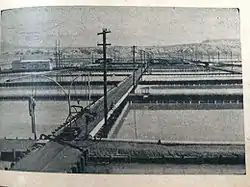 | |
Native name | מפעלי ים המלח |
|---|---|
| Type | Public |
| Industry | Chemicals & Extraction of Minerals |
| Founded | 1929 |
| Products | Potash, Bromine, Magnesium |
| Owner | Israel Chemicals |
| Website | www.Iclfertilizers.com |

The Dead Sea Works (Hebrew: מפעלי ים המלח, Mif'alei Yam HaMelakh) is an Israeli potash plant in Sdom, on the Dead Sea coast of Israel.
History
Under the British administration, concessions from the Mandatory government were given. On January 1, 1930, the "Concession for the extraction of salts and minerals in the Dead Sea" was granted to Palestine Potash Limited by the governments of Palestine and Transjordan jointly.[1] The company, whose directors included Moshe Novomeysky, had been incorporated in England in 1929 and registered as a foreign company in Palestine in 1930.[1][2] From 1936, it was a profitable enterprise despite attempts by the German potash cartel to strangle the business by dumping potash at below-cost prices.[3]
In the 1948 Arab–Israeli War, the northern half of the production facilities was occupied by the Jordanian Legion, which was destroyed in the ensuing fighting.[3]
In 1951, the company was nationalized by the Israeli government under the Ministry of Development.[4] In 1953, it was renamed the Dead Sea Works.[5]
Today

Dead Sea Works is the world's fourth-largest producer and supplier of potash products.[6] The company also produces magnesium chloride, industrial salts, de-icers, bath salts, table salt, and raw materials for the cosmetic industry.[6] It has customers in over 60 countries. Dead Sea Works is part of the Fertilizers Division of Israel Chemicals Ltd.[5] It is located in the southern basin of the Dead Sea and the extracted chemicals are exported around the world.[7]
Rather than extracting potash and other minerals from the Dead Sea by mining them directly, the company makes use of solar evaporation with 2-meter deep evaporation ponds.[8]
Controversy
Dead Sea Works has been blamed by conservationists for polluting the environment and contributing to the Dead Sea's evaporation.[9][10]

See also
References
- 1 2 Official Gazette of the Government of Palestine, No. 260, June 1, 1930, p424.
- ↑ Official Gazette of the Government of Palestine, No. 252, February 1, 1930, p76.
- 1 2 The political economy of Israel: From ideology to stagnation, Yakir Plessner
- ↑ "The Building of the Israeli State Sector, Case Study: The Palestine Potash Ltd". Archived from the original on 2011-07-21. Retrieved 2010-11-28.
- 1 2 "Dead Sea Works". Archived from the original on 2005-12-17. Retrieved 2010-03-09.
- 1 2 "Case Study: Dead Sea Works - Sdom, Israel". Archived from the original on 2011-07-16. Retrieved 2010-11-28.
- ↑ John Ward Anderson (2005-05-19). "For Dead Sea, a Slow and Seemingly Inexorable Death". The Washington Post. Retrieved 2007-11-07.
- ↑ "Odyysey React Boilerplate".
- ↑ Estrin, Daniel (13 June 2011). "Dead Sea threatened both by shrinking and flooding". Huffington Post. Ein Bokek, Israel. Associated Press. Retrieved 18 June 2013.
Environmentalists accuse the company of profiting at the expense of the ecology.
- ↑ Geological significance of the Dead Sea Archived February 9, 2011, at the Wayback Machine